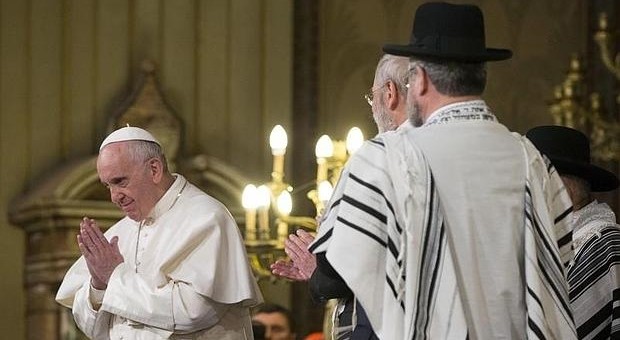Testigo de un hecho histórico: el Papa en la Gran Sinagoga de Roma
testimonio muy personal de nuestra amiga y ocasional colaboradora, líder comunitaria en los EEUU
In January, I was invited by Dr. Charles Small, founder of the Institute for the Study of Global Anti-Semitism and Policy (ISGAP) to come to Rome for Pope Francis’s first visit to the Great Synagogue of Rome. I was very excited– as was everyone I told – not because I was meeting a pope, but because I was meeting this Pope. Pope Francis – they called him Papa Francesco – is appreciated as a world leader, not simply the leader of the Catholic Church.
I was initially told that each of us in our small delegation would be given a few minutes alone with the Pope, but that did not materialize. Still, in anticipation of that meeting, I had asked a number of people, including my father, rabbis, scholars, diplomats, congregants, and friends, what they would say to the Pope. My father poignantly said that he appreciated the movement toward cooperation between Jews and Christians, which has been desired for so long. Many spoke of Pope Francis’s’ humanity. Tal Becker (of the Hartman Institute) spoke of the Pope’s humility of faith, which acknowledges that other faiths have a valid understanding of God and equal access to God. My friend, Rabbi Daniel Bouskila (of the Sephardic Educational Center), suggested asking the Pope to call a summit of leaders of the major world religions to explore how religious cooperation can improve our global society, to bring an end to violence and deprivations.
On Sunday afternoon, January 17, 2016, the Pontiff entered the magnificent sanctuary of the Great Synagogue, walking slowly to the bima, greeting people as he went. He greeted the entire row of Holocaust survivors, speaking to each one individually, kissing several of them. Then he came in front of my colleagues and me, greeting us. I shook his hand and said, “It is an honor to meet you, Your Holiness. You are so well respected and deserving of respect by so many people around the world.” He paused when I spoke to him, his head tilted a bit as he listened, his eyes focused on me, and then he nodded. It was truly an exciting moment. I was disappointed that there would not be a private meeting with him, and I had more to say, but still those few words were satisfying.
Amazingly, the Pope’s speech reflected virtually all of the major themes that people had brought to me and that I had been prepared to address in a private meeting. In broad strokes, he began by saying, “Todah rabah,” thanking us for the warm welcome. He spoke of his relationship with the Jewish community being very close to his heart, recalling his visits to the synagogue in Buenos Aires. He spoke of Christianity’s roots in Judaism and us being “united by the same God,” saying that for Christians to understand themselves, they must refer to their Jewish roots. Calling us “Elder Brothers,” he said that the Church must recognize “the irrevocability of the Covenant and God’s constant and faithful love for Israel.”
He referenced the 50th anniversary of the Second Vatican Council’s Declaration, Nostra Aetate, which “made possible the systematic dialogue between the Catholic Church and Judaism,” saying that “[i]ndifference and opposition have changed into cooperation and benevolence. From enemies and strangers we have become friends and brothers.” He said that every form of anti-Semitism must be rejected. Speaking of the Holocaust, he turned to the survivors and said: “Their suffering, their fear, their tears must never be forgotten. And the past must serve as a lesson for the present and for the future. The Holocaust teaches us that utmost vigilance is always needed to be able to take prompt action in defense of human dignity and peace.”
And then he called for Christians and Jews to work together on the many challenges facing our world, including ecological issues and violence. He said we “must offer humanity the message of the Bible regarding the care of creation. Conflicts, wars, violence and injustices open deep wounds in humanity and call us to strengthen a commitment for peace and justice. Violence by man against man is in contradiction with any religion worthy of that name, and in particular with the three great monotheistic religions.”
He closed with the Priestly Benediction from the Torah, saying last, “Shalom Aleichem!
Shalom Aleichem” were the words sung by the choir as Pope Francis had entered the 2 sanctuary. “Peace be unto you.” We have waited a long time to hear and to say these words. The Pope had come to our house of worship, where we met as equals, not as supplicants. And I felt blessed and enriched to be there.
For 2,000 years we longed to return to our homeland, and for 2,000 years we lived at sufferance in Christendom. At long last, after Nostra Aetate and with the wise and compassionate leadership of Papa Francesco, Esau and Jacob had come together as friends. And Esau’s embrace was a kiss upon Jacob’s neck.
Honey Kessler Amado, Los Angeles, 12 de febrero de 2016.

